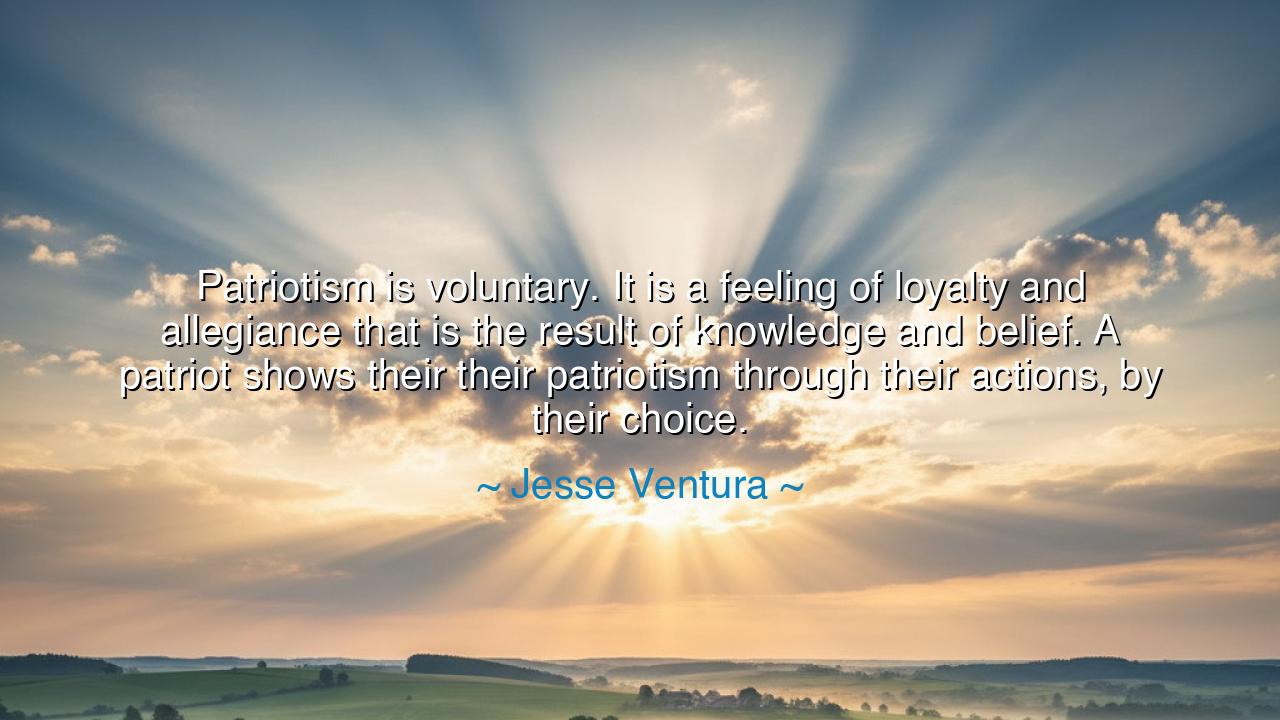
Patriotism is voluntary. It is a feeling of loyalty and
Patriotism is voluntary. It is a feeling of loyalty and allegiance that is the result of knowledge and belief. A patriot shows their their patriotism through their actions, by their choice.






The words of Jesse Ventura — “Patriotism is voluntary. It is a feeling of loyalty and allegiance that is the result of knowledge and belief. A patriot shows their patriotism through their actions, by their choice” — ring with the quiet strength of one who has both served and reflected deeply upon what it means to love one’s country. In this statement, Ventura reminds us that patriotism is not born of coercion or fear, but of conviction. It is not the echo of slogans or the blind following of authority, but the deliberate and conscious devotion of a soul that has seen the truth of its homeland — both its virtues and its flaws — and still chooses to serve it.
In the style of the ancients, we may say: a patriot is not commanded by law, but compelled by heart. The essence of Ventura’s wisdom lies in his understanding that loyalty without thought is not loyalty at all — it is submission. True allegiance must spring from knowledge and belief, from an awareness of one’s nation’s ideals and a personal choice to uphold them. The tyrant demands obedience; the free nation inspires commitment. And thus, the highest form of patriotism is not obedience to the state, but fidelity to the principles upon which that state was built — justice, liberty, and the dignity of every person.
The origin of this quote reflects Ventura’s own life, shaped by both military service and public leadership. As a former Navy SEAL, professional athlete, and governor, he lived through institutions that demand both loyalty and independence of thought. His experience taught him that love of country cannot be forced; it must be earned through understanding. He saw how some proclaim patriotism loudly while serving only themselves, while others — the quiet and steadfast — demonstrate it daily through courage, honesty, and sacrifice. Ventura’s words are a rebuke to hollow nationalism and a call to conscious citizenship, where love of nation is proven by one’s deeds, not declared in empty words.
Throughout history, we have seen this truth illuminated in the lives of those who acted not from command but from conviction. Consider Harriet Tubman, who risked her life countless times to lead enslaved people to freedom. She did not serve a government; she served a moral nation yet to be realized — one truer to its founding ideals. Her patriotism was not granted by laws, for the laws condemned her; rather, it was born from belief that all men and women were meant to be free. Her loyalty was to the promise of America, not its hypocrisy. And in her courage, we find the purest form of Ventura’s vision — patriotism through choice, guided by faith and moral clarity.
To say that patriotism is voluntary is to say that it cannot be purchased, coerced, or imposed. When it is demanded, it becomes propaganda; when it is freely given, it becomes sacred. Ventura’s teaching warns us that nations often mistake obedience for love, forgetting that a citizen who questions and holds power accountable is more loyal than one who merely applauds. For love of country is not the silence of conformity but the courage to defend its highest truths, even against those who betray them. The patriot acts from conscience, not from command.
This understanding is the same spirit that animated the great revolutions of history. When George Washington crossed the icy Delaware River on Christmas night in 1776, his soldiers followed not for pay or orders alone, but for belief — the belief that freedom could be born from struggle. Their patriotism was chosen, not enforced. They could have turned back to warmth and safety, but they pressed forward into the storm. Their victory was not only military, but moral — a testament that true loyalty arises when men and women align their hearts with their nation’s destiny.
And so, Ventura’s words stand as both a mirror and a challenge. They ask each of us: What do we truly serve — the image of our nation or its ideals? To be a patriot, one must first be a student of one’s country, to know its virtues and its sins, its triumphs and its failings. Only then can loyalty be pure, for only then can action be righteous. A patriot’s duty is not blind defense, but purposeful devotion — to build, to heal, to question, and to protect.
Let this be the lesson for generations to come: patriotism is not inherited, it is chosen. It must be renewed each day through action, compassion, and courage. The true patriot works not for applause but for posterity — for the unseen children who will one day inherit the nation we shape. Serve your country, then, not with empty praise, but with knowledge, belief, and love made visible in your deeds. For in the end, as Ventura reminds us, the truest measure of patriotism is not what one says, but what one chooses to do.






AAdministratorAdministrator
Welcome, honored guests. Please leave a comment, we will respond soon